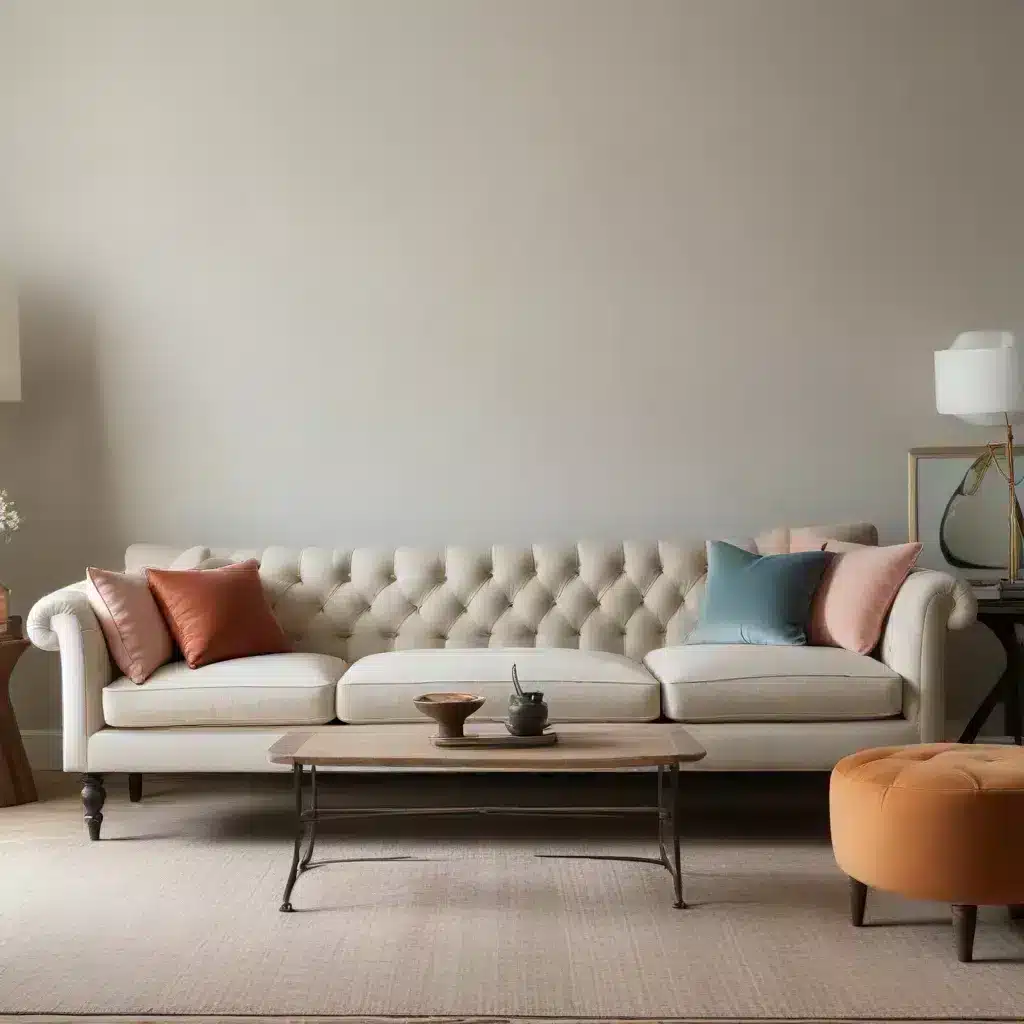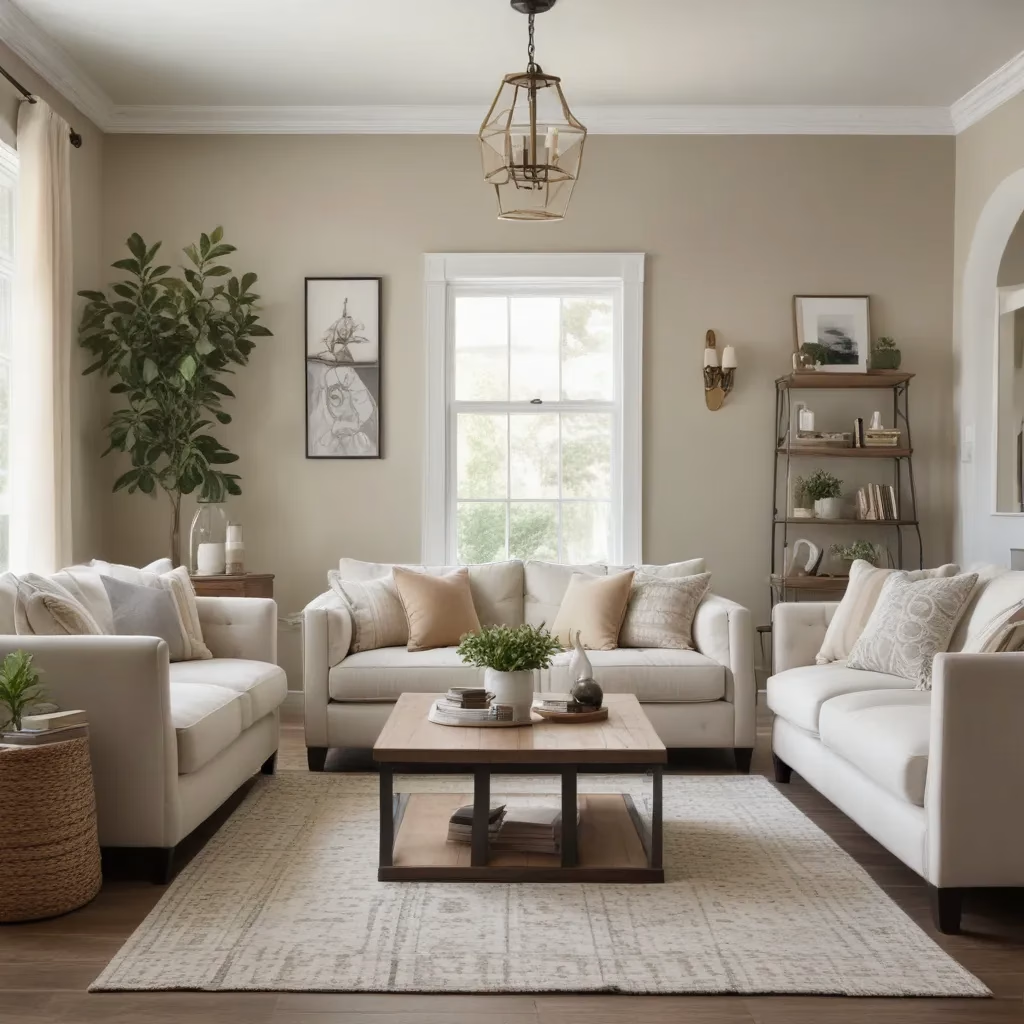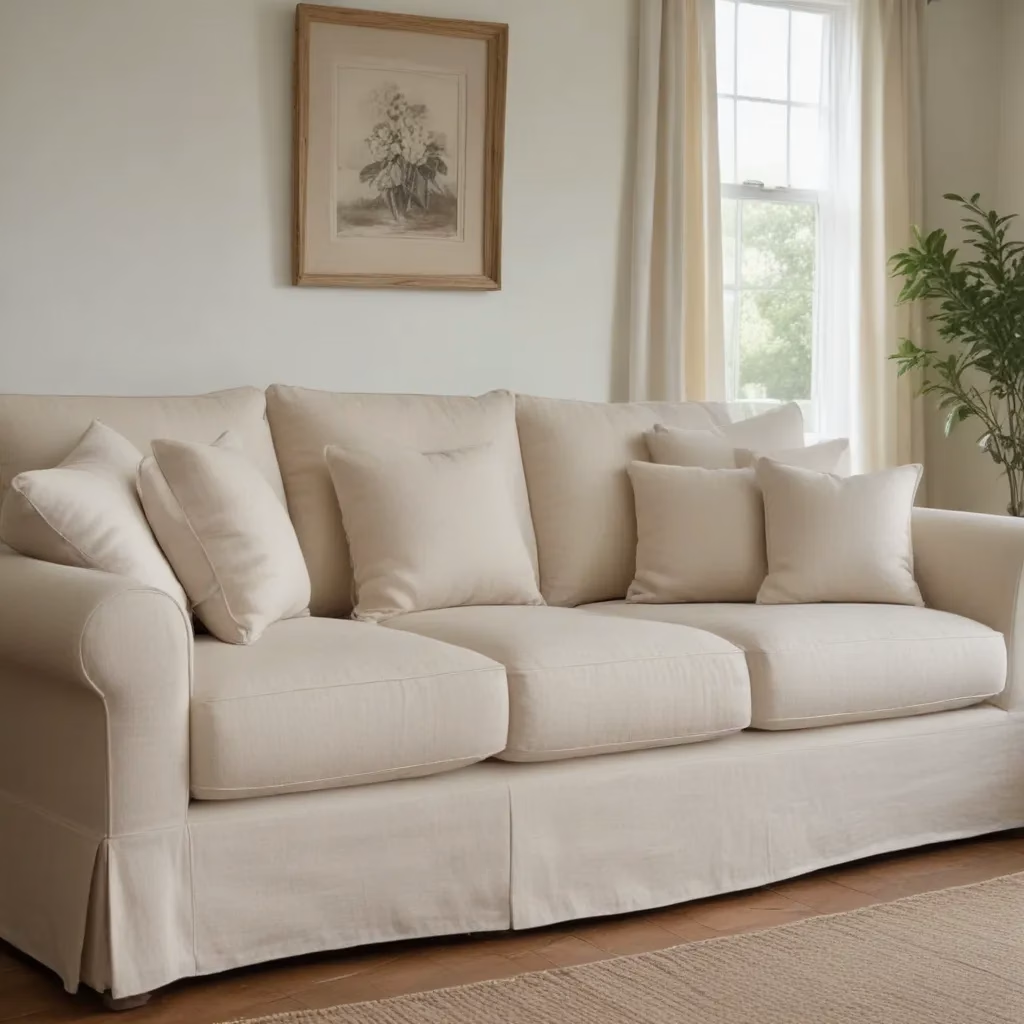
The Art of Sofa Selection
Selecting the ideal sofa for your living space is a nuanced process that requires careful consideration of various factors. As a furniture specialist with years of experience, I’ve guided countless clients through this journey, and I’m excited to share my insights with you.
When embarking on your sofa quest, it’s essential to reflect on your lifestyle, room dimensions, and aesthetic preferences. Are you a family with young children and pets, or do you prefer a more formal setting for entertaining guests? The answer to this question will significantly influence your choice of fabric, style, and overall durability requirements.
One crucial aspect often overlooked is the sofa’s depth. I’ve seen many clients fall in love with a sofa’s appearance, only to find it uncomfortable when they sit on it. A sofa that’s too deep can make you feel like you’re sinking, while one that’s too shallow might leave you feeling unsupported. I always recommend trying out different depths to find your sweet spot. Remember, comfort is king when it comes to sofas!
Upholstery Fabrics: The Make or Break Factor
The fabric you choose for your sofa can make a world of difference in both aesthetics and longevity. In my experience, this decision often proves to be the most challenging for many homeowners. Let’s break down some popular options:
Natural Fibers
Natural fibers like cotton, linen, and wool offer a timeless appeal and breathability. They’re excellent choices for those who prioritize eco-friendliness and a classic look. However, they can be more susceptible to staining and may require more frequent cleaning.
Synthetic Fabrics
Synthetic options such as polyester, nylon, and acrylic have come a long way in recent years. They often offer superior stain resistance and durability, making them ideal for high-traffic areas or homes with children and pets. Some modern synthetics even mimic the look and feel of natural fibers remarkably well.
Leather
Leather sofas exude sophistication and tend to age beautifully. They’re relatively easy to maintain and can last for decades with proper care. However, they can be more expensive upfront and may not be suitable for those with ethical concerns about animal products.
Performance Fabrics
These innovative materials represent the cutting edge of upholstery technology. They offer exceptional stain resistance, durability, and ease of cleaning. While they may come at a premium, their longevity often justifies the investment.
Here’s a comparison table to help you weigh your options:
| Fabric Type | Durability | Stain Resistance | Maintenance | Cost |
|---|---|---|---|---|
| Cotton | Moderate | Low | Moderate | $$ |
| Linen | Low | Low | High | $$$ |
| Wool | High | Moderate | Moderate | $$$$ |
| Polyester | High | High | Low | $$ |
| Leather | Very High | Moderate | Low | $$$$ |
| Performance | Very High | Very High | Very Low | $$$$ |
The Framework of Comfort: Sofa Construction
While fabric choice is crucial, the internal construction of your sofa plays an equally important role in its comfort and longevity. As someone who’s peered inside countless sofas over the years, I can attest to the significant differences in quality that aren’t always apparent at first glance.
Frame Materials
The frame forms the skeleton of your sofa, and its material can greatly impact durability. Hardwood frames, particularly those made from kiln-dried oak, maple, or birch, offer exceptional strength and longevity. They’re less likely to warp or crack over time compared to softer woods or particleboard.
In recent years, I’ve also seen an increase in metal frames, especially in modern and minimalist designs. These can be incredibly sturdy but may lack the warmth and traditional appeal of wood.
Suspension Systems
The suspension is what gives your sofa its ‘bounce’ and supports the cushions. There are several common types:
-
Eight-way hand-tied springs: Often considered the gold standard, these provide excellent support and distribute weight evenly. They’re labor-intensive to produce, which is reflected in the price.
-
Sinuous springs: These S-shaped wire springs are less expensive but can still offer good support. They’re commonly used in mid-range sofas.
-
Web suspension: Made from elastic webbing, this system is lightweight and affordable but may sag over time.
-
Pocket coils: Similar to those used in mattresses, these individual springs provide targeted support and are gaining popularity in high-end sofas.
Cushion Fillings
The filling in your sofa cushions significantly impacts comfort and maintenance requirements. Here are some common options:
-
High-resilience foam: Offers a firm sit and holds its shape well. It’s a popular choice for those who prefer a more structured feel.
-
Down: Luxuriously soft but requires frequent fluffing to maintain its shape. It’s often used as a wrap around a foam core for a balance of softness and structure.
-
Polyester fiber: An affordable option that mimics the feel of down but may compress over time.
-
Memory foam: Conforms to your body for personalized comfort but can retain heat.
In my experience, a combination of materials often yields the best results. For instance, a high-resilience foam core wrapped in down or polyester fiber can offer a perfect balance of support and softness.
Sofa Styles: Finding Your Perfect Match
When it comes to sofa styles, the options can seem endless. Over the years, I’ve helped clients navigate through a sea of choices to find the perfect fit for their homes. Let’s explore some popular styles and their characteristics:
Chesterfield
The Chesterfield sofa, with its distinctive deep-buttoned upholstery and rolled arms, exudes timeless elegance. It’s a style that has graced drawing rooms and libraries for centuries, but don’t be fooled into thinking it’s only suitable for traditional interiors. I’ve seen modern interpretations in bold colors and fabrics that look stunning in contemporary settings.
Mid-Century Modern
Clean lines, tapered legs, and minimalist design define the mid-century modern sofa. This style has seen a huge resurgence in recent years, and for good reason. Its simplicity allows it to complement a wide range of interior styles, from retro to contemporary. I often recommend this style to clients who want a versatile piece that won’t overwhelm their space.
Sectional
Sectional sofas offer unparalleled flexibility and are perfect for large families or those who love to entertain. They come in various configurations, allowing you to customize the layout to suit your space. I’ve found that L-shaped sectionals work particularly well in open-plan living areas, creating a natural division between different zones.
Lawson
The Lawson style, characterized by its boxy shape and loose back cushions, prioritizes comfort above all else. It’s a great choice for those who value relaxation and don’t mind a more casual look. I often suggest this style to clients with young children, as the removable cushions make cleaning a breeze.
Tuxedo
Named for its resemblance to the straight lines of a tuxedo jacket, this sofa style features arms the same height as its back, creating a sleek, boxy silhouette. It’s a fantastic option for those seeking a sophisticated, tailored look. I’ve found that tuxedo sofas work particularly well in smaller spaces, as their clean lines can make a room feel more spacious.
Remember, while these styles have distinct characteristics, many modern sofas blend elements from different styles. Don’t be afraid to choose a piece that doesn’t fit neatly into one category – sometimes, these hybrid designs offer the best of all worlds!
Sofa Placement: Maximizing Your Space
Once you’ve selected your perfect sofa, the next step is figuring out where to place it. This decision can have a significant impact on both the functionality and aesthetics of your room. Here are some tips I’ve gathered over years of helping clients arrange their living spaces:
Consider Traffic Flow
The placement of your sofa should never impede the natural flow of movement through the room. I always advise leaving at least 30 inches of walking space around the sofa. This ensures that people can comfortably move around without feeling cramped or having to awkwardly maneuver around furniture.
Create Conversation Areas
In larger rooms, consider using your sofa to create intimate conversation areas. Placing the sofa facing armchairs or love seats encourages interaction and makes the space feel more inviting. I’ve found that this arrangement works particularly well for clients who frequently entertain guests.
Mind the Focal Point
Most rooms have a natural focal point – it could be a fireplace, a large window with a view, or even a statement piece of art. Try to position your sofa in a way that complements this focal point rather than competing with it. For example, in a room with a beautiful fireplace, I might suggest placing the sofa parallel to it, allowing people to enjoy the warmth and ambiance while seated comfortably.
Balance the Room
If you’re working with a large, open space, consider using your sofa to create balance. A sectional sofa, for instance, can help anchor one side of the room, while a dining area or a reading nook balances the other side. This approach helps to define different functional areas within a single space.
Don’t Push It Against the Wall
While it might seem counterintuitive, pulling your sofa away from the wall can actually make a room feel larger. Even a few inches of space can create a sense of depth. In smaller rooms, try placing a narrow console table behind the sofa to make use of this space.
Remember, these are guidelines, not hard and fast rules. The key is to experiment with different arrangements until you find one that works best for your space and lifestyle. Don’t be afraid to think outside the box – sometimes, an unconventional placement can lead to a truly unique and personalized living space.
Maintaining Your Sofa: Tips for Longevity
As someone who’s seen sofas in various states of wear and tear, I can’t stress enough the importance of proper maintenance. A well-cared-for sofa can last for decades, becoming a cherished part of your home. Here are some tips I always share with my clients:
Regular Cleaning
Vacuum your sofa weekly to remove dust and debris. Use the upholstery attachment and pay special attention to the crevices where crumbs and pet hair tend to accumulate. For leather sofas, a quick wipe with a dry cloth can work wonders.
Rotate Cushions
To ensure even wear, rotate and flip your cushions regularly. This is especially important for sofas that see heavy use. I recommend doing this every few weeks or at least once a month.
Address Spills Immediately
Accidents happen, but how you react can make all the difference. Blot spills immediately with a clean, dry cloth. Avoid rubbing, as this can push the stain deeper into the fabric. For stubborn stains, consult the manufacturer’s cleaning instructions or seek professional help.
Protect from Sunlight
Direct sunlight can fade and damage upholstery over time. If your sofa is positioned near a window, consider using curtains or blinds to protect it during the sunniest parts of the day. Alternatively, you could opt for performance fabrics that offer UV resistance.
Use Arm Covers
The arms of sofas often show wear first, especially in households with children or pets. Arm covers can protect these high-use areas and are easy to remove and wash.
Professional Cleaning
Even with regular home care, a professional deep clean every 12-18 months can work wonders. It not only keeps your sofa looking its best but can also extend its lifespan significantly.
Mind the Pets
If you have pets, consider using a throw blanket on their favorite spot. This can be easily removed and washed, protecting the sofa underneath. For leather sofas, ensure your pets’ nails are trimmed to prevent scratches.
By following these maintenance tips, you’re not just preserving a piece of furniture – you’re protecting an investment in your home’s comfort and style. Remember, a well-maintained sofa doesn’t just look better; it feels better too, providing you with years of comfort and enjoyment.
For more expert advice on sofa care and selection, don’t hesitate to visit our website at Sofa Spectacular. We’re always here to help you make the most of your living space!
The Future of Sofa Design: Trends to Watch
As someone who’s been in the furniture industry for years, I’ve witnessed firsthand how sofa designs evolve to meet changing lifestyles and aesthetic preferences. Looking ahead, I see several exciting trends shaping the future of sofa design:
Modular Versatility
Modular sofas are gaining popularity, and for good reason. These versatile pieces allow you to reconfigure your seating arrangement to suit different needs. Whether you’re hosting a movie night or a cocktail party, a modular sofa can adapt to the occasion. I’ve seen clients fall in love with the flexibility these pieces offer, especially in smaller urban apartments where space is at a premium.
Smart Integration
As our homes become increasingly connected, so too are our sofas. Built-in USB ports and wireless charging pads are just the beginning. I anticipate we’ll see more sofas with integrated smart features, from voice-activated reclining mechanisms to built-in speakers and even health monitoring capabilities.
Sustainable Materials
Sustainability is no longer just a buzzword; it’s becoming a key consideration in furniture design. I’m seeing a growing demand for sofas made from recycled materials, organic fabrics, and sustainably sourced woods. Some innovative companies are even experimenting with biodegradable upholstery materials.
Multifunctional Designs
As our living spaces evolve, so do our expectations of furniture. Sofas that double as guest beds or include hidden storage compartments are becoming increasingly popular. I’ve worked with several clients who were amazed at how a well-designed multifunctional sofa could transform their space.
Bold Colors and Patterns
While neutral tones will always have their place, I’m excited to see more clients embracing bold colors and patterns in their sofa choices. Vibrant jewel tones and playful prints are making a comeback, adding personality and energy to living spaces.
Curved and Organic Shapes
After years of boxy, streamlined designs dominating the market, I’m noticing a shift towards softer, more organic shapes. Curved sofas and rounded edges are gaining traction, creating a more inviting and relaxed atmosphere in living rooms.
Textural Interest
Texture is becoming as important as color in sofa design. I’m seeing an increase in tactile fabrics like bouclé, velvet, and textured weaves. These materials not only look luxurious but also add depth and interest to a room’s overall design.
Customization Options
Personalization is key in modern furniture design. More manufacturers are offering customization options, allowing buyers to choose everything from the arm style to the leg finish. This trend towards bespoke pieces ensures that each sofa is uniquely suited to its owner’s taste and needs.
As we look to the future, it’s clear that sofa design will continue to evolve, blending functionality, style, and technology in exciting new ways. Whether you’re drawn to cutting-edge smart features or timeless classic designs, the sofas of tomorrow promise to offer something for every taste and lifestyle.
Remember, while trends can be inspiring, the most important factor in choosing a sofa is how well it suits your personal needs and style. At Sofa Spectacular, we’re always excited to help you navigate these trends and find the perfect sofa for your home.
Conclusion: Your Perfect Sofa Awaits
As we’ve explored throughout this guide, finding the perfect sofa is a journey that involves careful consideration of various factors – from style and comfort to durability and maintenance. It’s a decision that goes beyond mere aesthetics; it’s about creating a focal point for your living space that reflects your lifestyle and personality.
Remember, there’s no one-size-fits-all solution when it comes to sofas. What works beautifully in one home may not be the best fit for another. That’s why it’s crucial to take your time, do your research, and if possible, try out different options before making your final decision.
Whether you’re drawn to the timeless elegance of a Chesterfield, the versatility of a sectional, or the sleek lines of a mid-century modern piece, there’s a sofa out there that’s perfect for you. And with the exciting trends we’re seeing in sofa design, from smart integration to sustainable materials, the options are more diverse and innovative than ever before.
As you embark on your sofa-shopping journey, don’t hesitate to seek expert advice. At Sofa Spectacular, we’re passionate about helping you find the sofa of your dreams – one that you’ll love coming home to for years to come.
Happy sofa hunting, and here’s to many comfortable years ahead in your perfect living space!



